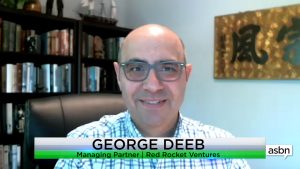As a startup, you want to keep your costs low, which can sometimes hurt you in the long run. On today’s Small Business show, we’re joined by George Deeb, managing partner at Red Rocket Ventures, Forbes contributor, and author, to walk us through how short-term thinking can hurt long-term success.
Deeb believes every entrepreneur wants to save money, but the problem is that “If you’re saving money at the expense of cutting the nose off your face,” you’ve gone too far. He asserts, “A good entrepreneur can balance long-term thinking with short-term thinking. Also, they can get the right middle ground; the cheapest isn’t always the best.” Short-term thinking has the intent of benefiting every decision or action that enhances today’s cash flow, regardless of its impact in the long run.
Due to human talent, you get what you pay for. To illustrate, Deeb highlights a lawyer. They’re supposed to expand your business to the next level. So, you want the person with the best experience, who may often have the highest rate. However, Deeb suggests, “This isn’t like a loaf of bread in the grocery store. You may have to spend more for the intent of your business and its future success.”
Short vs. Long-term planning
To Deeb, a younger software may have many bugs that need to be ironed out, and the more expensive software may offer additional features and functionalities that the cheaper software may not have available to it. In which the difference may be in yielding productivity and cost savings.
Deeb asserts, “It’s not always a race to the bottom on price for software; you have to find the right intersection between the features your business needs at the lowest price.” It’s important to note, short term thinking can hurt the immediate short-term.
For instance, if your business depends on a shipping company, you anticipate exceptional service, on-time deliveries, and no damage. However, if weeks go by and the company continues to miss deliveries, or if you have to deal with complaints, “In the end, you’re hurting your brand. Therefore, you should choose the best company offering the best service at the best price rather than the cheapest,” emphasizes Deeb.
Final thoughts
“To me, you need to stop obsessing about every nickel and dime on the income statements.” Deeb encourages entrepreneurs to shift their focus away from expenses and more to revenue. What will propel your business to new heights that is the most cost-effective? Deeb suggests the mindset that will shift your business from the bottom-line expenses to the topline revenue. As a result, differentiating between the two will accelerate your business, and you can scale from there.








